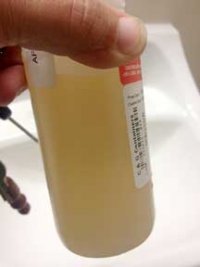Clean water still the goal in state enforcement case

An agreement between Beshear administration and Frasure Creek Mining is not fair, reasonable or in the public interest, Franklin Circuit Judge Phillip Shepherd was told Monday afternoon.
“It appears that the parties want the court to rubber stamp this agreement with very little consideration of it merits,” said Mary Cromer of the Appalachian Citizens Law Center, representing KFTC and other clients. “The cabinet has attempted to minimize the number of violations … and marginalize public” involvement.
The agreement at issue was negotiated two years ago by those two parties after Appalachian Voices, Kentucky Riverkeeper, Waterkeeper Alliance and KFTC brought to the public’s attention tens of thousands of violations – including what appeared to be intentionally false pollution discharge reports – of the Clean Water Act by Frasure Creek and International Coal Group (ICG). Those violations had been ignored for years by officials with the Kentucky Energy and Environment Cabinet.
You can read more history of this case and access court documents here.
The agreement was so weak in terms of preventing future water pollution violations and penalizing the companies for past and ongoing violations that the four groups asked to and were allowed to intervene in the case.
Since then, the groups were able to reach a settlement with ICG and the cabinet that strengthens enforcement through stipulated penalties for future violations and independent third-party monitoring, while also directing fines for past violations into water quality projects in eastern Kentucky.
But no such agreement was reached with Frasure Creek because of the company’s current financial situation, cabinet and company attorneys told Judge Shepherd.
“What should be duty of Frasure Creek to produce evidence of inability to pay and court’s ability to look to the parent for that?” asked Cromer. Frasure Creek is a subsidiary of Trinity Coal, which is owned by the profitable Essar Group based in India.
Cromer also pointed out that in the agreement, the cabinet primarily addressed paperwork violations by Frasure Creek and not the underlying and likely rampant water pollution violations that were actually occurring.
“The cabinet knew the data it was looking at was suspect and that pollution violations were likely,” said Cromer, citing testimony confirming this from cabinet officials during a trial in 2011. “This wasn’t real data – there were likely real problems going on. [But] the consent judgment was written solely to deal with monitoring and reporting violations."
In fact, data through 2011 show that real water pollutions violations were ongoing.
Cromer also reminded the court of the Beshear administration’s resistance and disdain for the public’s involvement in the case, including going all the way to state supreme court attempting to get Judge Shepherd’s order allowing invention overturned. “We’ve been treated as a nuisance throughout.”
After the violations and the cabinet’s failure to enforce the law were exposed two years ago, both the companies and the Beshear administration blamed the laboratories that were doing the testing for the companies. At the time, state officials pledged to create a new lab certification process.
But that has not yet occurred, cabinet officials admitted Monday on a question from Judge Shepherd. They said it was still in the “regulation development process.”
Shepherd indicated he would rule soon on the motion to enter the consent judgment from two years ago. If he does not, that would open the possibility of discovery of Frasure Creek’s financial condition and further negotiations.
Recent News
Kentucky’s past legislative session showed alarming trend toward government secrecy
Churchill Downs takes more than it gives. That's why the Kentucky Derby is a no-go for me
‘We must never forget.’ Kentucky town installs markers for lynching victims.
Featured Posts
Protecting the Earth
TJC Rolling Out The Vote Tour – a KFTC Reflection Essay
KFTC Voter Empowerment Contractor Reflection Essay
Archives
- Home
- |
- Sitemap
- |
- Get Involved
- |
- Privacy Policy
- |
- Press
- |
- About
- |
- Bill Tracker
- |
- Contact
- |
- Links
- |
- RSS


Add new comment